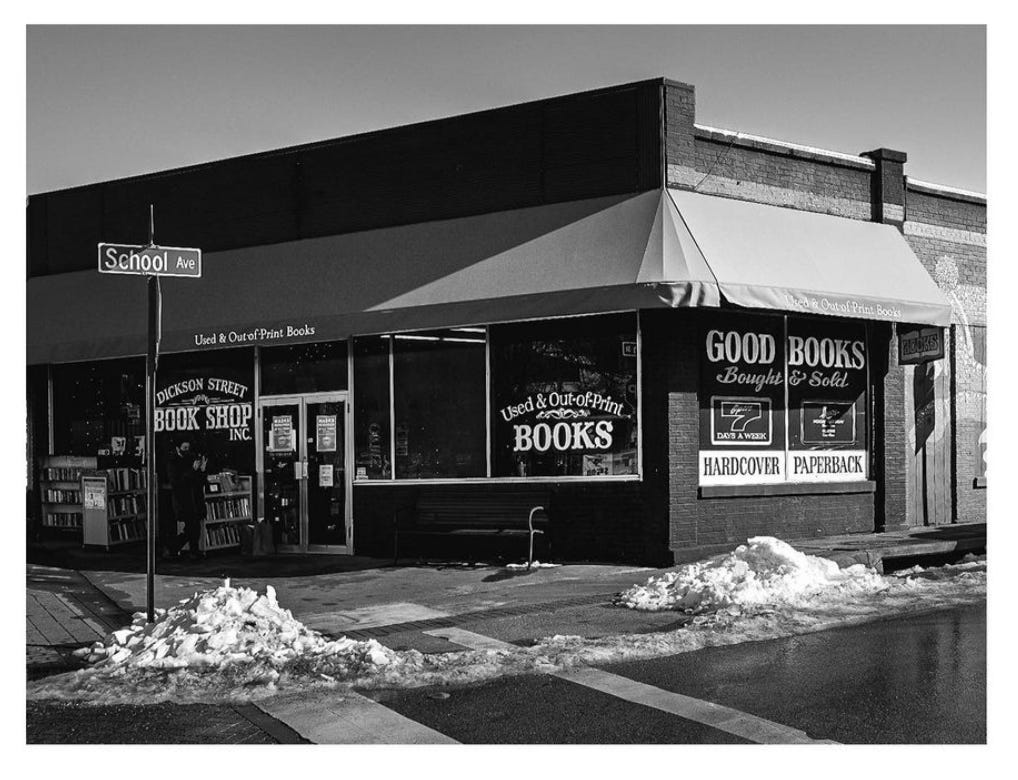We know what FOMO is — but what about FONO? We’ve all been going through the same collective experience with the pandemic, but as it hopefully winds down (🤞), we might all go through a somewhat surprising form of re-entry (similar to Tsh’s cross-cultural experiences). Seth and Tsh unpack what it means to be hesitant to return to normalcy, knowing full-well that there really is no going back to it. What does it mean to live in a post-pandemic world? And what good stuff can we take with us from our lockdown lives?
Seth: Website | Newsletter | Twitter | Instagram
Tsh: Website | Newsletter | Twitter | Instagram
Tsh’s Rule of Life workshop
Zero Waste Home, by Bea Johnson
Chasing Excellence with Ben Bergeron
Find us on Substack–we have some fun stuff coming up soon
Check out all Rothy’s shoes, bags, and masks available right now at Rothys.com/FRIEND.
Scroll down for the transcript.

Seth: Welcome to A Drink With a Friend, I’m Seth Haines.
Tsh: And I’m Tsh Oxenreider.
Reed, you and I have talked about how, obviously this pandemic isn’t good, but there have been surprising good things that have happened this past year in spite of it. What are some of the things that you’ve come to appreciate because of quarantine and lockdown and what we’ve had to do this year?
Reed: I guess, being able to stay home more as in I like not having to go to extra things. New ideas for school and other things or we could do this even after the pandemic.
Tsh: Are there things that you don’t want to see return once the pandemic gets better?
Reed: One thing I want to stay the same is being able to Zoom in or Google meet into class and stuff like that so you don’t have to miss class if you are sick or out.
Tsh: You actually like virtual school a little bit?
Reed: Yeah.
Tsh: Okay. Because not everyone does.
Reed: Yeah. I like it.
Tsh: And then just generally, societally, what do you see that has become better because of a forced lockdown?
Reed: I guess more people are getting to be more creative and stuff like that.
Tsh: It’s cool to see people be resourceful, right. Is that what you mean?
Reed: Yeah.
Tsh: It’s like people are tapping into a side of them they didn’t know they had or didn’t make the time to tap into.
Reed: Yeah.
Tsh: Because we’re really grateful that we have not gotten really sick in our family, would you say you will look back and think of this more as a good season in your life or a bad season in your life?
Reed: Kind of a mix.
Tsh: Really?
Reed: Bad as in pandemic, a lot of people couldn’t get together but good as in I’m not forced to get together with people.
Tsh: [laugh] Spoken like an introvert.
Reed: And being able to read more.
Tsh: Do you want life to go back to normal?
Reed: What do you mean by normal? Some things I want to change but other things I kind of want to stay the same.
Tsh: Yeah. That’s really the issue, right? What is normal?
Reed: That’s the only correct answer to that question. What is normal?
Tsh: Yeah. What do you mean by that?
———-
Seth: What are you drinking today?
Tsh: We are talking in the late morning which we don’t always do which means it’s heavily coffee time. I’m drinking good ole black coffee. It’s an Ethiopian heirloom blend from Cafe Creole which I actually can find in the regular grocery store but it is decent coffee. They are sustainable, not free-range [laugh], fair trade.
Seth: Free-range coffee, that’s amazing.
Tsh: It is. Grass-fed coffee. [laugh] I like it. It’s just good. It’s our staple standby. Black coffee it is. I’m on my second cup because it’s late morning. How about you? What are you drinking?
Seth: This will not surprise you because again, it is late morning and so I am drinking coffee also. I’m drinking the standby Onyx brew that I have been drinking for the last month and a half, maybe, with the exception of a couple of breaks for some beautiful Airship coffee and that terrible coffee that I got from my parents. I’m drinking Onyx this morning and it is delightful. We’ve been on spring break so I have not been coming into the office space where I keep said Onyx which means that I’ve been drinking whatever we have at home and I forgot how good this stuff is.
Tsh: Right.
Seth: It’s so good.
Tsh: Good coffee is one of life’s great little pleasures. We just got back from camping last night and I brought one mug for everything and so I had some herbal tea the first night and I could not get the taste out of the mug the entire time even with the strongest coffee so the whole time I had this weird, herbal berry coffee that was just horrific and I was just craving normal coffee so that’s what I’ve got this morning for the first time in days.
Seth: Congratulations. It’s always good to get away from herbal coffee.
Tsh: It is. It was awful.
Seth: You know what I like about what we’re doing?
Tsh: What?
Seth: I like that we’re having conversations as friends but also this is an embarrassing thing to say but I’ve always been a fan of yours. I am a Tsh Oxenreider, and really, everything Oxenreider, including Kyle, fan. It’s kind of fun. One of the things that I really love is that as a fan I get to learn from you. This week, you, in our messaging, you dropped a phrase that I have never heard.
Tsh: Really?
Seth: The minute I heard it, I thought, huh. I wonder if that explains my entire forty years of living and it’s the concept of FONO. Today, I am super excited as a fan to sit here and interview you and perhaps learn some things from you. I hope you’re ready for that.
Tsh: Well, sure. I don’t think of myself as an expert so much as someone living in the reality of it and that’s why this topic is so interesting to me because I think for the first time in human history, which we have been saying for year now, we are all living through something collectively. A year in, I think we’re all shifting to this idea of FONO whether or not we realize it. If you hear that jingling in the background, that is my dog, Ginny, scratching herself. Sorry. We’re just going to go with it.
FONO, we all know FOMO, or most of us do. It’s the fear of missing out, which thanks to the likes of Instagram and other social media platforms, it’s all to easy to succumb to in our life because we see other people going on amazing vacations and getting together and having clean houses and children that obey, that you think, gosh, I am missing out on the good life that Instagram shows me. Which of course, we all know is heavily curated and most likely not at all real. FONO is this thing I read about a few weeks ago, a week ago, and to me, that is it. It is the fear of normalcy. FONO with an N. It’s the fear of normalcy and in general, it’s maybe the fear of living an ordinary life that doesn’t really matter, at least what we think. But specifically right now, with the pandemic, it’s the fear things going back to the way they were even though you have these mixed feelings of I’m kind of looking forward to it, yet deep down I’m also not and I feel weird about that. Seth, I want to unpack with you because I’m really curious about you and Amber and your boys. We all know that the pandemic sucks. Nobody is going to argue that and yet there’s some weird stuff that was a surprising delight. I’m curious for your clan, what were some of the surprising delights from this quarantine time?
Seth: Last night we were talking. It’s our spring break and I went down to my parents house and we were sitting on the back porch and they have both now been vaccinated. And a neighbor who has been vaccinated. The neighbor came over last night and they were all sitting outside on the back porch. Still being cautious. My mom was just talking about how much she had loved that and needed that. Some of those badges of normalcy returning. I think all of us really do. One of the things that she said that I thought was really interesting. My mom is in her 60s so she sees the world through a much more mature lens probably than I do and certainly probably than most of the world does. She says, there was a lot of things that I was doing before that I just refuse to do now. I’m not going back. She didn’t really tell me what those things were although I have some punches, if you’re listening, mom, we should talk about that. Maybe you could tell me what they are. She said, what are you going to not go back to? What are you going to give up? What’s going to change for you? We didn’t really unpack it because the conversation was fluid, we moved on to something else. I really started thinking about that last night and my normal pre-pandemic was really just to do everything that I was asked to do because I was asked to do it. I was much more social media connected, pre-pandemic. As odd as that is, I would think that when you’re in lockdown you’d be more connected to social media but I wasn’t. I was churning things because of some of the things I do in writing and other spaces. I thought about her question on the way home and I think it relates to your question. I think there are just things that I don’t want to return to allowing life to carry me in it’s flow undirected. I was not in the best shape of my life because I was so busy that I wasn’t carving out time to actually engage my body in any difficult way. I was so busy trying to market my writing that I felt the necessity, I felt like social media was a necessity. I was so busy that at times I didn’t have time to really stop and focus and meditate and pray. The normal that I don’t want to get back to is life sweeping me along in it’s flow and in a sense, I feel like I have agency but I really don’t because I keep doing everything that’s put in my way. I think that’s where I am. That was my pre-pandemic. Frankly, my kids were doing it, too. I was leading our kids in that same direction. Any athletic event that they wanted to do, we did. I think now, we can’t be that busy and be healthy because in a lot of ways this big year-long pause helped us identify areas of unhealed in our life and correct that.
Tsh: Yeah. I don’t think you’re alone. I think a lot of people, including most of our listeners, had that experience where we all had the inevitable hardness of not getting to some of things that we love doing but the surprising forced benefits that we didn’t see coming or maybe we did and we were clamoring for them and this gave us a little bit of an excuse to embrace them. I don’t know.
Seth: Yeah. Are there things that you miss from normal?
Tsh: Sort of. Kyle and I had this experience, just to lay the foundation, of mid-March being right when Tate, our oldest daughter’s theater group was doing their spring or winter show. We got the notice of lockdown right before they could do their second performance of Fiddler on the Roof. They had been practicing and rehearsing and doing all the things which takes so much work, both for her but even for us, as the parents transporting and volunteering and doing all the things. It was a sudden, Thursday night they performed, Friday morning we got the text saying, “Show is canceled.” Then Saturday, they asked for parent volunteers to come and tear down the set that was going to be up all weekend so they could do four shows. We had this experience of a literal on/off switch with an activity that afterwards, after we just did the utilitarian, okay, let’s just take down the set and interact with each other, see if everything is okay. Kyle and I, secretly to ourselves said, this is kind of nice. We, of course, felt for the kids who had been working hard, including our daughter. Because March 2020 was the way it was, they all said, we’ll do the show in a few weeks or maybe in a month, we’ll see. Just hold tight. Kyle and I were both intrigued by the idea that we were relieved. Show week is always a major event in our lives that is both exhausting but fun. Very social. People everywhere nonstop. My introvert bucket gets depleted. We both felt weird about liking lockdown at first. Especially when so many of our friends were bemoaning and being sad about not getting to see people. Kyle and I were like, thank you for this sweet relief of having a reason to hunker down a little bit. We like local. We like where we live. We like being home as best we can. We’re kind of a paradox. We both like going to the opposite side of the Earth and we like being home a lot. I think a lot of people are like that. For me, as it’s been a year now, what I find I miss are the impromptu smaller gatherings. I miss the friends getting together for an easy dinner or let’s all go to the neighborhood pool and bring your own dinner and we’ll just hang out while the kids swim. Let’s all just go to the park and hang out events. I don’t miss the official, capital E, events like a show week. I hate to say it, but I just don’t. I don’t miss school-sponsored functions. I don’t miss parties and this is probably just me but it’s a real thing, this FONO of being nervous about these things ramping up again and not knowing what to do with it. You feel these mixed feelings. It’s a sign of things being better because the pandemic is lessening but it’s also a sign of not having as much agency as you feel like you have whenever you’re forced to be at home and find ways to occupy your time. That’s the thing I’m really interested in because I keep hearing this from people that almost are saying it under their breath. They are fearful of admitting it but I think all of us have some version of it right now.
Seth: To answer my own question, there are certainly some things that I miss. I miss going to the movies with my kids. I don’t miss spending one billion dollars at the concession stand. There are some events like that I miss. To your point, what a relief it was to not have to navigate Christmas parties in 2020. And New Year’s Eve gatherings. What a relief it was in some ways, and I love my family, Thanksgiving was a relief. It was slow, it was simple. There were just a lot of those things where I didn’t realize how much of a break I needed. Maybe there’s something to this. Maybe there’s something to that fallow year. Taking space off every now and then to reset and recalibrate and ask yourself, what is normal? I think that’s my big question to you with this idea of FONO, is that it assumes a normal. And the normal that it assumes actually, and maybe it’s just my personality type, but feels really abnormal to me. The normal that it assumes is a hectic pace. A go-go-go. Always on. Always gathering. Going with the flow of the river. Not guiding yourself. Always saying yes. Maybe that’s a misread on my part.
Tsh: Do you remember when everything first started last Spring when there were pictures floating around the internet of before and afters in different places around the world with pollution and…
Seth: Traffic?
Tsh: Traffic. I remember the picture of the Taj Mahal with the smog before and after. To me, those were visual reminders of what we’re talking about here. This idea of wait, that’s normal but shouldn’t that be normal? How do we make it like that all the time without a global pandemic? I think that’s what we’re talking about here, taking the good of the forced lockdown and making it our normal. Making it our ordinary to where we want life to go back to normal because we’ve redefined normal.
Seth: That’s right.
Tsh: I think that’s a very apropos astute feeling you’re talking about. This idea of wait, I should be glad but maybe I don’t like this definition of normal that I’ve had this whole time. For me, I’m reflecting a lot of this on my experiences of travel and in particular living overseas in a cross-cultural environment, what it’s like to go through the thing called reentry. This thing that is inevitable that everybody goes through that you can’t escape and yet it’s easy to pretend like it’s not going to happen to you or that it’s not that big a deal. And it is. My process right now, and I think I’m encouraging other people right now, is to go through a little bit of reentry reflection because it’s real. Whenever the five of us went on our backpacking trip around the world for a year, we went for a lot of reasons but one of the main reasons was for fun, because we wanted to. For some reason, I think I told myself that because of that, reentry wouldn’t be as big a deal which I don’t even know what I was thinking at the time. We’ve had all sorts of experience living overseas in challenging environments. We knew, and yet our reentry was really rocky because we weren’t prepared for it. To me, that’s the lesson learned here. As we reenter a little bit of normalcy, the thing to remember, this is an idea called reverse culture shock. When you go somewhere that’s not your culture, you experience culture shock. Whenever you come back to your home culture, you experience reverse culture shock because the world maybe didn’t change around you but you did. Now you have to reckon with the unchanged world and the changed you. Perhaps the world is going to go back to its unchanged self and yet you like the changed you or you want to keep up some practices and habits. To me, that’s what this is reflective of and it’s real. I think the reminder here for all of us is that we have to go really easy on ourselves. Super gracious and kind to ourselves because it’s not pretend. It’s not all in your head. It can show up in our physical selves when it comes to sleep or health or anxiety. It’ll show up like that. It’ll show up in relationships. It’ll show up in our responses to things where we’ll be short-tempered and maybe even feel a little depressed or just apathetic, acedia. There’s all sorts of ways that this reentry can manifest itself and all are okay and yet all need to be addressed and reflected on.
[ad break]
Seth: Talk to me about this. You are an expert, you say you aren’t an expert on anything but you are sort of an expert on reentry. You are.
Tsh: Okay.
Seth: You’ve done it a lot. Isn’t that fair?
Tsh: Sure. I think it’s fair, I guess.
Seth: It’s fair. You could write a book on it. You are an expert on reentry. One of the things that we talk about here a lot is really being captivated by the good, the true, and the beautiful. Really taking stock of what’s good, true, and beautiful. It seems to me that there is a real intersection here for reentry and it seems to me that maybe what we discovered in lockdown, for some of us and maybe for a lot of us, was a simpler way, a more beautiful way, a truer way. A lot of us have discovered who we really are. We discovered some really good things, like how to grow food or how to make sourdough. I know those are trope-y but just scroll your Instagram feed. It’s spring. Everyone is planting.
Tsh: Uh huh.
Seth: It seems to me that when we talk about reentry into whatever the world or the market is going to call normal, we need to hold on to some of those good, true, and beautiful things that we’ve found, like what you’re saying. The world may not have changed when it reopens back up but we have. My question for you is how do you take stock of and hold onto some of those good, true, and beautiful things? What are some steps that we can all take as we reenter the world to remember who we’ve become over the last year and to carry that with us into this new or old normal? How do we carry our new selves into the old normal?
Tsh: Speaking of tropes, some of this is going to sound trope-y but there’s a reason tropes exist, right? Sometimes they’re kind of true. A lot of times they’re true. The first one, and this is legit, even though my kids roll their eyes at this, and that’s to create a gratitude list. I cringe saying that but I mean in a real way. I don’t mean in a Pinterest worthy way. I mean like in your journal, start making a practice of writing down maybe three times a day, sorry, once a day, three things you are grateful for. I like to do this practice at the end of the day because it’s sort of an Ignatian Examen. This idea of a backwards prayer looking back and seeing where you saw God that day. The other thing I recommend is being really specific because you start noticing the little things in your life. I don’t just mean a home or family, which is so easy to do. I mean, think of like that one joke my kid told. I’m thankful for that because he’s growing in his sense of humor and he’s actually becoming legitimately funny. This is one of mine, that’s recent. Or some food, or that particular brussel sprout recipe is damn good. I’m so grateful for it and I found something that my kids will eat that’s green. That kind of thing. Be grateful and acknowledge the gratitude. What that does is that it helps you acknowledge when things feel like, when it feels like everything sucks or everything is stressful, it forces you to slow down and realize even when everything feels overwhelming, there are some good things in life. That’s one step.
The second step, once you make this part of your daily routine, I don’t want this to sound like a shameless plug, but it’s our show, is to create a rule of life. What this rule of life does is it helps you write down on paper the things you care about and the things you don’t care about. I say shameless plug because I have a “pay what you want” audio workshop for it. We’ll put a link in the show notes. Basically, it’s the way I write my rule of life and I visit it two times a year, revisit it, at the new year and on my birthday, but anytime is great. It helps you think through the six parts of your life and the practice that I’ve come to embrace is looking three years into the future and it doesn’t mean in a blue sky, loosey-goosey how would everything be perfect, but in a reality, what do you want your life to be like in three years? I pick three years because three years is accessible enough to be real. If we do ten years, that’s who knows, really? One year is still too much where you are right now but if you look three years in the future you can think, okay, my oldest will be college age, what the heck? Are we still living where we’re living? All these things. To me, creating a rule of life to where you work backwards from three to one year to one month to right now, helps you realize it’s our daily choices that affect. You know that Annie Dillard quote, how we spend our days is of course how we spend our lives? It’s that idea. We have this picture in our head of I want to be someone in shape. I want to be fit. I want to care about my physical health but until you’re the person that goes to CrossFit or puts on your running shoes and go for a run, it remains an idea. I think we can apply this to the idea of FONO as we start opening back up in the world during this still pandemic but it’s getting better. You can think about the things that matter to you and draw a line a little in the sand. You might realize, like you said, we don’t have to every single sport available to us. The line in our sand is going to be one sport per kid per year and you gotta pick. Or I realized I did not miss eating out as much and oh my gosh, we saved so much money. We are now going to eat out once every two weeks instead of three times a week. Stuff like that. It helps you to actually get granular and think about it.
Seth: I like it. One of the things that I do as I help, you know this, I help coach, organize, sometimes write for other authors. One of the things that I like to say a lot is when you’re trying to tell a story, be as granular and specific and as time bound as possible. If I’m telling you about my journey to fitness, I probably don’t need to tell you every detail of my life from the age of six to twelve, because it probably doesn’t really matter. There’s probably actually a point at which my journey to fitness fell off and where I picked it back up and those very specific things are important. It’s the specific times that really matter in any story that we tell. It’s the specific actions within the specific time. Time is a character. When you’re talking about things like a gratitude list, particularly when we’re focusing on this fear of normalcy, this fear of the return to normalcy, it seems to me that it would be helpful, it could be helpful to look back at the last year to juxtapose that particular time against the world before and to say what am I grateful for about the last year? What is the rule of life I’ve cultivated in the last year? What pieces of that gratitude, what pieces of that rule of life do I want to carry forward as we move into this return to normalcy. Again, saying if these are going to be my two practices, let’s make sure it’s not just like you said, pie in the sky. These are things I really like and so these are things I’m going to do. No, what are the things that have changed about me in the last year that are very particular to the last year and that I want to hold onto that I don’t want to lose? I guess my question to you is, do you think that would be helpful to narrow it down to the last year? If so, what are some things for you, you know what? I want to carry this into the new normal. Specifically.
Tsh: I think reflecting on the past year has to happen for all of us. In the spirit of reentry, to pretend like we can just slide right back into normal and just, oh well, the goodness of last year or not acknowledging the good things and the bad things combined, it not only to miss out on an opportunity but I think it will have ramifications later. I kept hearing throughout the year about how we’re all going through this low-grade trauma. I think that’s real. I’m a high school teacher part-time and we would talk in staff meetings sometimes whenever we’re just frustrated at why do they ask for instructions for the thing I said clearly, all the teacher complaints. We would inevitably need to remind ourselves that these teens are going through a really hard thing and we got to give them a lot of grace. The same grace that we want for ourselves. I say that to say it’s easy at this point, a year in, to think, come on, get over it. You’re fine. Moving forward. That was a year. When really, there’s trauma to unpack. There are also good things to unpack. I think reflecting on the past year is essential to look back to acknowledge the good and the bad and I think that a gratitude list is key for that. I completely agree with you and I think the two ideas as you reflect that are important are first, it’s okay to mourn change that you don’t like or want. Not everything from this past year you love. It’s okay to acknowledge that I did not like that. I did not like all of us being on top of each other in the house and I did not virtual school where my kids were on screens 22 out of 24 hours a day, or whatever. It’s okay to mourn the change that you don’t like that’s coming. Perhaps, you liked some form of virtual school. Perhaps you liked the lack of school activities and all the papers that come home. It’s okay to mourn the idea that that might return. With that, remember that there are these newfound practices you are allowed to keep because you’re not required to return to business as usual. In a weird way, we’ve all been given this blank slate, sort of. While some things are inevitable, like traffic. I’ve mourned the loss of that low traffic phase of the pandemic. It’s back up to near normal here in central Texas and I hate that. There are some things that I can control. Since you’re asking me specifically, I think I shared this with Amber because I did garden a little bit before but in a really small way. I really learned a lot about gardening during the pandemic. I want to keep this a regular practice now. We’ve got the chickens, we’ve got the raised beds. I like that some of our food comes form the backyard. I’m not going to aspire to lofty ambitions where 100% of it will, but hey, perhaps I can get a little better at this over time and learn about canning next. That’s actually on my to-do list, to-learn list next. I like that. I like that our kids, I don’t want to say they’ve become different people but I feel a bit like they have learned a lot more about each other and how to be friends with each other and I’m not necessarily ready for them to go their separate ways. They need to, because they are different ages and it’s good to have your own life, I want our family routine of a lot more togetherness to continue. I need to think through. This is a great example. I need to think through, what does that look like boots on the ground? How about you? What’s something you want to keep doing?
Seth: To me, one of the big realizations of the pandemic was just how much fragility is baked into the world. I think for a long time, we assumed that wars don’t really affect us anymore. At least not the major industrial countries. That food supply is always going to be there. That pandemics were a sort of thing that for the industrial countries, the developed countries, those ended in 1818 and 1819. I think there’s been a very real realization for me that the world is fragile. We had food shortages here, I don’t know if you did there. It wasn’t a ton but it was some staple stuff. Food supplies are fragile. Life is fragile. Things are fragile. We’ve all lost friends. Things are fragile. For me, part of it is just understanding, that I want to carry forward, is understanding that the world is fragile. Systems are fragile. Our bodies are fragile. We just can’t take anything for granted. It doesn’t mean we live in fear. It doesn’t mean that we freak out but by the same token, if I can keep yeast alive in a starter or if I can can some of Amber’s vegetables or whatever the case may be. If I can go push my body a little bit harder to make me a little less fragile, those are the things that I want to carry forward. All of these practices of anti-fragility. I think there’s a lot of, I hate this because it feels like such a jargon-y word these days, but I feel like there was a lot of fragility pre-pandemic and the way we lived our lives. I think a lot of that will return, if I’m being honest. I just don’t want to go back there. For me, the idea of carrying a tougher ethos, I know that sounds like a man thing to say, or a masculine thing to say, but I don’t think it’s wholly masculine. Carrying a tougher constitution. Strengthening our family systems. Strengthening the structures that we have to feed us and care for us. A lot of that is going to mean not engaging in the systems of the world the way we used to. A lot of it will mean doing a little bit more of that, too. If I’m being honest, when things open back up and the economy rolls a little bit more, I’m going to try to make hay while the sun shines. Because you don’t know when that next period of fragility is coming. I know for a lot of our listeners, and for me, there was a three-month period there that was really frightening. Where is the money going to come from? Is this all going to shut down? I think even continuing to strengthen our systems economically. Our family economics. That’s a part of what I want to carry forward.
I think there’s a lot of this return to normalcy that I just don’t want. I don’t want the soft way of living anymore. I know that sounds awful trope-y but I just think that we’ve realized that we’re tougher than we thought and carrying that toughness forward is really important.
Tsh: I think there’s a real reason why there was so many comparisons early on to the eras of the Great Depression and World War II because those are markers of that generation, right? The toughness. The resiliency and the reckoning with this is real life. I feel exactly the same way and I think one thing that I’ve been mindful of is how our modern culture loves to pacify with entertainment. We love to ignore the feelings of there should be more or is this all there is by just clicking next on Netflix or going out to eat again. For me, it’s a simple idea of making those for entertainment, which I know sounds cliche. I remember feeling this way when we first moved overseas. Oh, the realities of day-to-day living need to be my fun. Things like making sourdough bread. Perhaps you don’t do that regularly anymore but maybe you do it once a month and that becomes a form of entertainment. Or slow cooking becomes your fun. Or learning a new skill through YouTube but you’re using your hands becomes your fun instead of just trying to drown out the world with some distraction. Dovetailing the idea of entertainment with real work I think is a good way for us in 2021 to realize this. Of course, our grandparents in the 40s and 30s would never call it entertainment. They would call it survival. We literally have to grow food or we don’t eat. Since we don’t have to now, yet if you want to because who knows when the next have to will come, then make it your fun. That’s what I’m learning.
Seth: That’s good. I love it. As usual, I have learned a lot from you on this show and in our friendship about FONO and now I have practices to not have to be fearful, I guess. I don’t know if I was actually fearful anyway. I’m stubborn so I had stubbornly decided that I’m not going to go forward the way I used to. But, not everybody is stubborn, so there you go.
Tsh: I think fear can look like different things, too.
Seth: Yeah. Tsh, what exactly are you reading, watching, or listening to right now that has brought a little truth, beauty, or goodness to your life?
Tsh: Right now I am skimming through the book, Zero Waste Home by Bea Johnson. It dovetails rather well with the topic that we were just talking about. It was written ten years ago and my neighbor down the street lent it to Tate because she knew that Tate was into being green and hippy these days and that we always have been as a family. It’s a book that talks about how to eliminate waste in your life. This family, since 2008, has managed to accumulate the amount of trash that can fit into one-quart size jar every year. She just goes through and explains the different practices she inhabits so that that is a reality. I’m not under the illusion that we will ever get to that point, nor do I even really want to put that much effort into that idea, but I love the spirit and the ethos behind it. I figured, if I can pick up three to five tips and it makes our waste just a little bit less, then it’ll be worth the read. That’s what I’m reading. There you go.
Seth: I love it.
Tsh: How about you? What are you reading, watching, or listening to?
Seth: I have been listening to the podcast called Chasing Excellence by Ben Bergeron. I don’t know if you know this podcast but he’s the owner that runs CrossFit, I think New England. I don’t really get into self-help podcasts and I’m not a big fan of the excellence language for a variety of reasons. I think it’s starting to mean something that it doesn’t actually mean. But, that said, I really love this guy. I love his podcast. Yesterday, I listened to his latest episode which he had a guest on talking about endurance and overcoming and the mental game of actually doing more than you think you can do and how a lot of times we quit because we think we can’t do anymore but it’s actually a mental issue, not a physiological issue. I think that really applies to a lot of things in our lives. I think a lot of times we give up because we think we can’t do xyz. We can’t take another step. But really a lot of that really is mental and I think it’s right. The reason I’m listening to this is because, I’ll just share this with you, last week, where we are as a person who is avidly cross-fitting now, we are in the middle of the CrossFit Open. I don’t know if you remember this from your days of Cross-Fit but last week’s exercise was Dante’s 7th Circle of Hell. It was a violence to the body and all I wanted to do when I was finished was writhe in pain and agony and pray the Lord to take my soul. After that workout, I’ve been super fascinated with this idea of pushing human limitations into pain and to see what’s on the other side. This was a first step in that direction. That’s what I’ve been listening to, it was really inspiring.
Tsh: Alright. We’ll add that podcast to the show notes if anyone else wants to make meaning out of circles of hell in their life right now.
Seth: Yes, right. Yes.
Tsh: I get it.
Seth: There are many.
Tsh: It is time to wrap this up. You can find this episode, as well as all episodes, at adrinkwithafriend.com. It’s also where you can sign up for our new Substack space for the show, where we have plans for some pretty great extra stuff for you, and it’s also where you can support this show for just a few bucks. If you like what we’re bringing to your earbuds, we are almost 100% listener-supported and we like it that way — so again, all this is at adrinkwithafriend.com and in the show notes of this episode. You can find me and all my work at tshoxenreider.com — Seth, where can people find you?
Seth: You can find me at sethhaines.com. Sign up for my newsletter there, follow me on Instagram, all at sethhaines.com.
Tsh: Nice. Music for the show is by Kevin MacLeod, editing is by Kyle Oxenreider, and Caroline TeSelle is our transcriber and assistant extraordinaire. I’m Tsh Oxenreider, and Seth and I will be back here with you soon. Thanks for listening.











